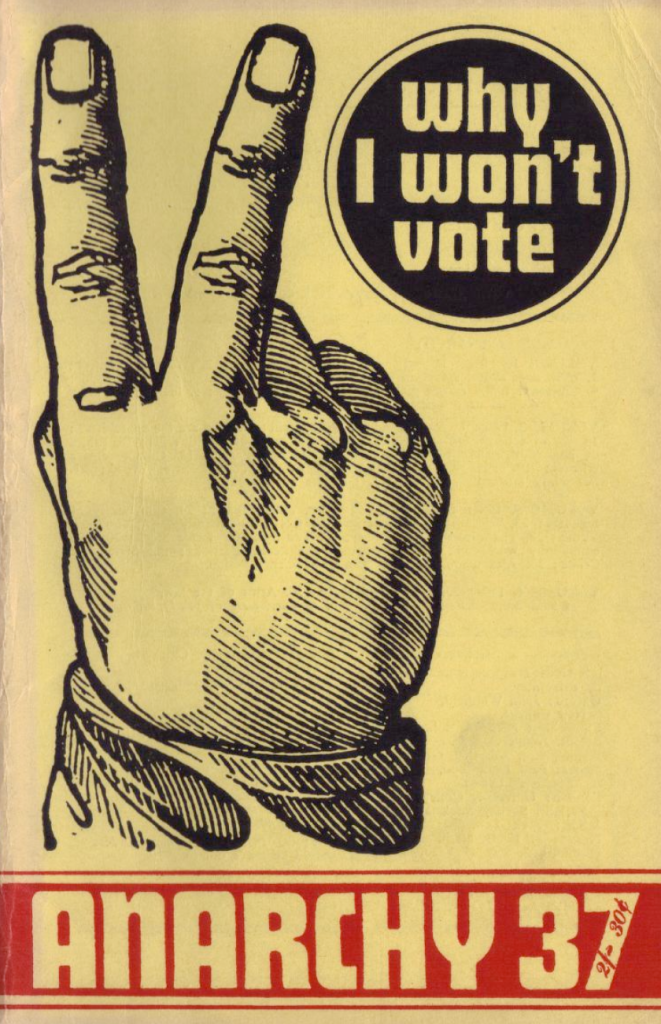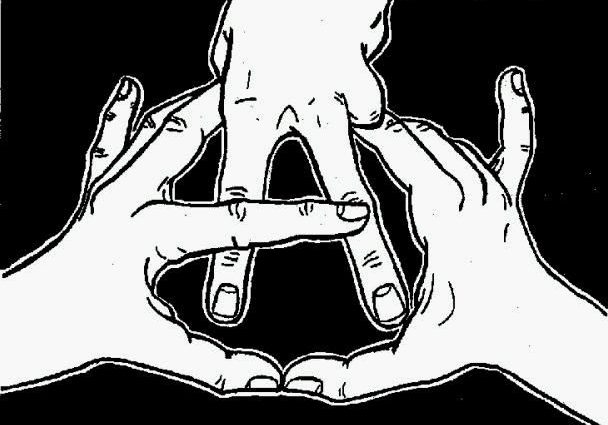
Anarchy 37, March 1964,
Why I Won’t Vote
CHARLES RADCLIFFE
When the American magazine Liberation held a which-way-shall-we-vote survey in October 1956, the alarming thing about the contributions was the combination of insight into the nature of American society and liberal totalitarianism and the startlingly naive and irresponsible courses of action proposed. The effect General Elections have on some anarchists is similarly alarming. The letters page of freedom illustrates this, as the Liberation survey did, though it is only fair to say that the non-anarchist Liberation contributors were reasonably sophisticated in their stupidity.
Some people, who for four years out of five remain impeccable libertarians, seem to go mad as the General Election approaches. They ask us to vote, as though we might have some effect on the collective insanity by choosing some of the insane as leaders. We can acknowledge that there are people who cannot help wanting to make decisions for others, but there is no reason why we should encourage them. Those who ask us to vote Labour forget that the 1945 government used troops to break strikes and started the independent manufacture of the British atom bomb; that parliament is a cypher and the real power in society lies elsewhere, increasingly uncontrollable and secret; that, even if real power did lie in Parliament, they should, as anarchists, reject Government and coercion in favour of direct action and mutual aid. In short, they forget that anarchism is not primarily a word or a label but a way of behaving and, above all, of reacting. They forget this at a time when anarchism can be shown as a coherent and deeply felt objection to the way in which our society does things, and as an alternative to the chicanery of the “electoral fulfilment of social and democratic responsibility”. I don’t believe the General Election is an opportunity to choose enemies. I oppose contemporary society rather than the people thrown to the top by it. I don’t recognise the distinctions between the different brands and different packagings of the authoritarians.
I shall not vote because I believe the General Election to be marginal in our social and political life: it does not represent an opportunity to change the horse, or even the jockey, but simply to sack, and replace, a few stable lads. At a time when we should be attempting to persuade more people of the value of direct action and ad hoc groupings for specific ends, it is sad that some anarchists should wish to divert our energies by persuading us to follow the herd into public displays of undiscriminating lunacy. (I apologise for my intellectual fascism, but people who behave with all the characteristics of sheep are deserving of sympathy but no more).
Liberation argued that “most electoral contests are struggles between groups that have substantial vested interests in ‘office holding’ between machines which provide jobs, money and prestige to fairly large numbers of people.” This is true of Britain, also. The issues which divide the parties are artificial: questions of management rather than basic policy. The election is primarily ritualistic. The real issues of the day — increasing centralisation and state control, the arms race and the like -are not usually put before the people. They are not put because they cannot be put, and they cannot be put because even a programme of “democratic” seizure of administrative power has no room for policy lessening State power. Even when such issues are put, they are put according to a traditional pattern, to be applauded not because they are worth applause but because applause has always been accorded them. Liberation analysed this ritual. Mentioning the flag waving, drum beating, exploitation of war records and the visions of the ship of State floundering on the rocks of creeping socialism, it said “… all this serves the purpose of creating a feeling of identification, a sense of excitement and participation. Politicians and opinion makers exert strenuous efforts to fix attention on the ritual and create the impression that it is the ritual act itself — in this case, the casting of the vote, which is efficacious. Voting as a result becomes an isolated magic act set apart from the rest of life, and ceases to have any political or social meaning except as an instrument by which the status quo is conserved”. Election pageantry serves the same purpose as Roman circuses — the beguilement of the populace. The voter is reduced to voting for dazzling smiles, clean teeth, smooth voices and firm handshakes, playing the role of a shaking puppet manipulated by the party image mongers.
The least anarchists can do in such circumstances is to make an attempt at tangling the strings so that the puppeteers find them less easy to manipulate into the correct postures. People who compromise their ideas for a liar’s promise are fools, and it is hard to see how such anarchists can tell other people that they reject power and government and authority, if, once every five years, they elect someone to exercise power and authority over them. It all seems rather too paradoxical.
I’m not convinced that withholding my vote, as such, is very constructive. I’m not convinced that the General Election is very important either. I don’t think we need a change at the top — either as a change of enemy or for the health of society’s sake. I’m not going to contribute to the change. I do my voting every time I get a new idea or talk to friends about things that really matter, or every time that I convince someone that anarchism is a viable” here-and-now” thing. I try to cast “my whole vote, not a strip of paper merely “; I go on demonstrations—which I hate — because it’s worth the effort and I write inadequate articles to convince people that there is something in anarchism. I listen to music, read books and do the shake at jazz clubs. It doesn’t sound much, it seems a lot better than a five-yearly compromise with the authorities.
